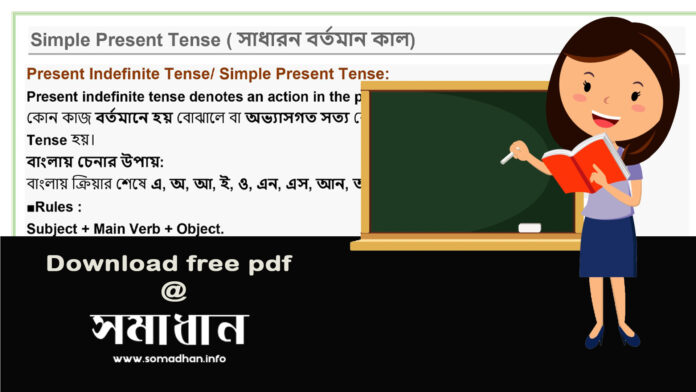Simple Present Tense ( সাধারন বর্তমান কাল)
Present Indefinite Tense/ Simple Present Tense:
Present indefinite tense denotes an action in the present time or habitual truth or eternal truth.
কোন কাজ বর্তমানে হয় বোঝালে বা অভ্যাসগত সত্য বোঝালে বা চিরসত্য বোঝালে Present Indefinite Tense হয়।
বাংলায় চেনার উপায়:
বাংলায় ক্রিয়ার শেষে এ, অ, আ, ই, ও, এন, এস, আন, আয় ইত্যাদি থাকে।
■Rules :
Subject + Main Verb + Object.
Example:– আমি ভাত খাই – I eat rice.
– আমি স্কুলে যাই – I go to school.
– তুমি বই পড় – You read a book.
Note – Subject third person singular number (he, she, it, কোন ব্যক্তি, বস্তু, জায়গা বা প্রাণীর নাম) বোঝালে verb এর শেষে s বা es বসে।
– সে প্রতিদিন স্কুলে যায় – He goes to school every day.
– সে রাত দশ টায় ঘুমাতে যায় – He goes to bed at ten pm
– সূর্য পূর্ব দিকে উদিত হয় – The sun rises in the East..
■Negative sentences: সাধারন বর্তমানে না সূচক বাক্যে অর্থাৎ বাক্যে না ,নয়, ইত্যাদি শব্দ থাকলে বাক্যকে Negative sentences বলে।
Rules:
Subject +do/does + not + Main Verb + Object.
Example:– আমি ভাত খাই না – I do not eat rice.
– আমি স্কুলে যাই না – I do not go to school.
– তুমি বই পড় না– You do not read a book.
Note – Subject third person singular number (he, she, it, কোন ব্যক্তি, বস্তু, জায়গা বা প্রাণীর নাম) বোঝালে does not বসে।
– সে প্রতিদিন স্কুলে যায় না– He does not go to school every day.
– সে রাত দশ টায় ঘুমাতে যায় না– He does not go to bed at ten pm
– সূর্য পশ্চিম দিকে উদিত হয় না – The sun does not rise in the East..
■Positive Question form: সাধারন বর্তমানে হ্যাঁ- বাচক প্রশ্ন গঠনের নির্দিষ্ট নিয়ম আছে।
Rules :
Do/does +Subject + Main Verb + Object?
Example:– তুমি কি গল্পের বই পড়ো? – Do you read story books?
-তোমরা কি মাঠে খেলো?- Do you play in field?
– তারা কি পুকুরে মাছ ধরে ?- Do they catch fish from pond?
Note – Subject third person singular number (he, she, it, কোন ব্যক্তি, বস্তু, জায়গা বা প্রাণীর নাম) বোঝালে does বসে।
Example:– মা কি রান্না করে? – Does mother cook?
-সে কি মাঠে খেলো?- Does he play in field?
– রহিম কি গাড়ি চালায়?- Does Rahim drive car?
■Negative Question form: সাধারন বর্তমানে না- বাচক প্রশ্ন গঠনের নির্দিষ্ট নিয়ম আছে।
Rules :
Do/does +not +Subject + Main Verb + Object?
Example:– তুমি কি গল্পের বই পড়ো না? – Do not you read story books?
-তোমরা কি মাঠে খেলো না?- Do not you play in field?
– তারা কি পুকুরে মাছ ধরে না ?- Do not they catch fish from pond?
Note – Subject third person singular number (he, she, it, কোন ব্যক্তি, বস্তু, জায়গা বা প্রাণীর নাম) বোঝালে does not বসে।
Example:– মা কি রান্না করে না? – Does not mother cook?
-সে কি মাঠে খেলো না?- Does not he play in field?
– রহিম কি গাড়ি চালায় না?- Does not Rahim drive car?
■Wh Question form : Wh word অর্থাৎ Who( কে ) , Where ( কোথায় ) ,When ( কখন ) ,Why ( কেন ) ,What ( কি ) ,How ( কিভাবে ), Which ( কোনটি ), ইত্যাদি দ্বারা প্রশ্ন গঠনের নির্দিষ্ট নিয়ম আছে।
Rules :
Wh-word +Do/does+Subject + Main Verb + Object?
Example:– তুমি কেন গল্পের বই পড়ো? – Why do you read story books?
-তোমরা কোথায় খেলো?- Where do you play ?
– তারা পুকুরে কি ধরে ?- What do they catch from pond?
Note – Subject third person singular number (he, she, it, কোন ব্যক্তি, বস্তু, জায়গা বা প্রাণীর নাম) বোঝালে does বসে।
Example:– মা কখন রান্না করে? – When does mother cook?
-সে কোথায় খেলো ?- Where does he play in field?
– রহিম কেন গাড়ি চালায় ?- Why does Rahim drive car?
■Wh-word Negative Question form: সাধারন বর্তমানে না- বাচক প্রশ্ন গঠনের নির্দিষ্ট নিয়ম আছে।
Rules :
Wh-word +Do/does+ not +Subject + Main Verb + Object?
Example:– তুমি কেন গল্পের বই পড়ো না? – Why do not you read story books?
-তোমরা কোথায় খেলো না?- Where do not you play ?
– তারা পুকুরে কি ধরে না?- What do not they catch from pond?
Note – Subject third person singular number (he, she, it, কোন ব্যক্তি, বস্তু, জায়গা বা প্রাণীর নাম) বোঝালে does not বসে।
Example:– মা কখন রান্না করে না? – When does not mother cook?
-সে কোথায় খেলে না?- Where does not he play in field?
– রহিম কেন গাড়ি চালায় না ?- Why does not Rahim drive car?
Click here to download



